How Swimming Got Me In and Out of Depression
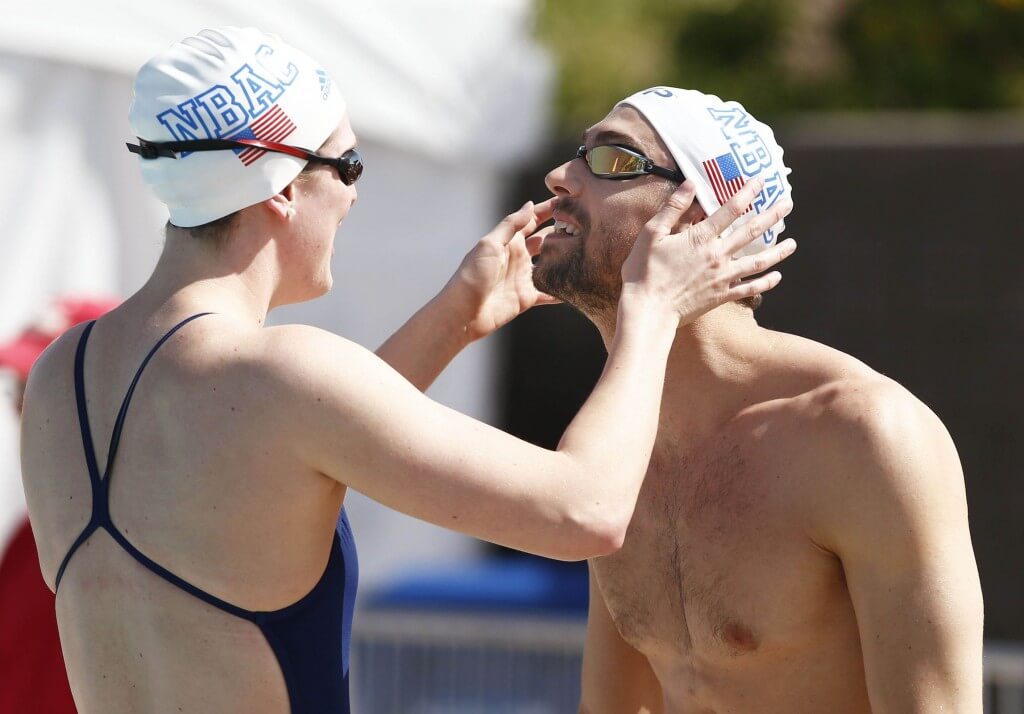
By Andy Ross, Swimming World Contributor
Originally posted May 25, 2017
I took a run today around my campus’ lake. Last week I graduated college and finished my last semester with my first 4.0 in the history of my life. I was looking at everything around the lake; the turtles sunbathing on the submerged logs; the ducks walking around the perimeter. They all looked so peaceful and calm. They reminded me of the small beauties in life. From this small paragraph you just read, you may think my life is pretty good, which it is. I am happier than I have ever been, but that is because one year ago around this time, I had been in the darkest points of my life.
For all this to make sense, you should know more about me. My freshman year of college, I got sick during my conference meet. I missed out on the 400 IM and swam the 200 breast at about 60 percent energy. I still went a best time, but I knew I could have been much faster. I trained hard and–actually, you can read that story from one of my previous articles here. (Cliff Notes version: I didn’t get my “break out meet” in college until my junior year, which was last year.)
I swam my best times ever at my junior year conference meet. I was relieved. I had just turned 21 and was ready for a break from the sport. But this break felt different. I felt like I had done everything I wanted to do with swimming. I had never had a “great” short course season, so when I finally had one, I lost a lot of my drive to continue that momentum. I mean, from April 2015 to March 2016 I was so focused on becoming a better swimmer that I felt like I needed to blow off some steam after that season. But I never quite got that “itch” to get back into swimming like I usually get during the off-season. There were a couple times when I was fed up swimming, but those episodes would only last a few weeks. This time it felt like it wouldn’t end.
My ultimate goal in swimming was to make Olympic Trials. I “missed” the 200 breast cut by about four seconds in July 2015. I felt like if I kept training that I could drop enough time before June 2016. But the problem was I didn’t want to get back in the water after March. I wanted to take three weeks off, but I knew if I took only two off I’d be in better position to make Trials. For whatever reason, I took that third week off, kissing goodbye any realistic chances at making Trials.
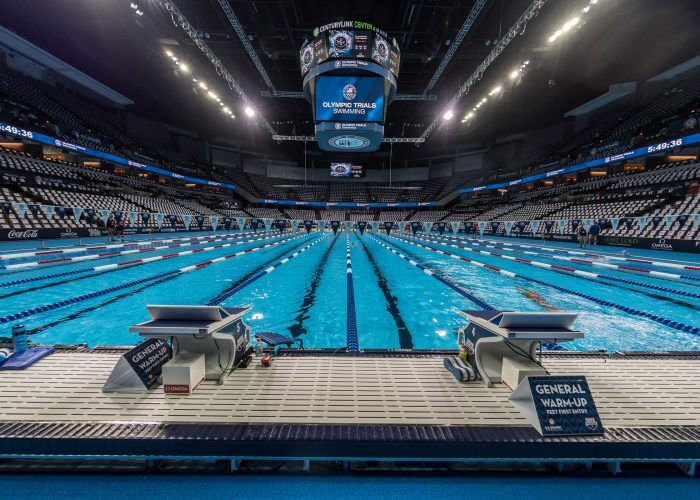
Photo Courtesy: Peter H. Bick
I hardly trained in the spring. I went to practice every day, but only in the afternoons. I wasn’t motivated as much as I had been in previous seasons. I wasn’t going to optional mornings and I was hardly lifting. I went back home in May thinking I was going to be fine to train with my club team. Big mistake.
I wasn’t “out of shape” per se but I definitely was not ready to exercise that much. My body was not ready for the seven upcoming pool sessions that week when I came home (we had a meet that weekend so I was spared all-day Friday and Saturday morning) plus the three lifting sessions. All I remember about that first week was that I was sleeping…a lot.
It was exhausting. There were times where I would skip breakfast so I could go right back to sleep after morning practice. There were times when I would sleep through lunch and have to grab a bag of trail mix to eat before I lifted. There were times I would take two naps in one day–after each practice.
I pretty much lived that summer on energy bars, energy shakes and fueling station food. It did not help that I would look at snapchat stories and see my friends taking vacations around the country, while I was stuck having to go to practice. I was miserable.
My body was so sore from lifting and not eating that I was performing terribly in practice, which added on to my misery. I used to thrive on the satisfaction of finishing a hard practice. I loved knowing that the practice you just finished would add up to you out-touching someone at the end of the year. But I was having terrible practices, I wasn’t eating, and I wasn’t seeing any of my friends. I had never felt more trapped.
My mom noticed something wasn’t right. She came by on her lunch break and asked if I was ok. “I’m fine,” I insisted. Obviously she wasn’t buying that answer.
My family members would come in from out of town to visit for a few days. I couldn’t stay long because I had to make sure I’d make it to weights on time. I couldn’t eat a large meal for lunch, because I had to make sure I could survive practice. I started to talk back and act erratically to my family and I didn’t know why. It just happened and I didn’t know how to control it.
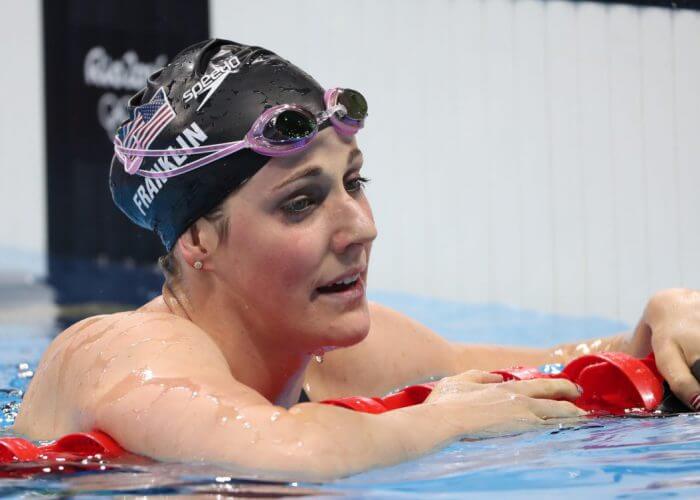
Photo Courtesy: Erich Schlegel-USA TODAY Sports
Practices became harder as the summer went on, which I did not enjoy. There was one Saturday in particular though that still haunts me to this day. I’m not going to give away too many details, but the practice said “8 a.m. start time to whenever we finish.” I got through about half the practice before I missed an interval and got out of the pool and broke down in tears. My dad drove me home from practice and I told him everything; how I was starting to hate swimming; how I wanted to quit; how I wanted to take a vacation. He unofficially diagnosed me with quasi depression.
The day after that, I collapsed from what I thought was just normal car sickness. I laid on the couch and I couldn’t move for about four days. I could barely walk around the house and I couldn’t eat anything from loss of appetite. I had lost 15 pounds in one month. Three months prior, I was on top of the world when I had the best meet of my life. I was gearing up for my last year of swimming ever and I had no strength or motivation to keep me going.
How did I even get here? I had read stories about depression, but did not know what it truly was. I always just thought my problems were never bad enough compared to other people. I was ready to quit swimming and not go back to school. But I knew that would be a mistake. I had to make things right.
I spent a lot of time thinking on that couch about how I had gotten to this point in my life. I kept looking for people to blame, but I don’t blame anyone but myself. I didn’t train as hard as I should have in the spring. I didn’t take proper care of my body, and to make everything worse, I was extremely irritable and shunning the people closest to me. The latter was what hurt me the most. I felt isolated because I felt like I had burned too many bridges with the people on my team. This was not who I was and I really needed to change that.
I was able to get back in the pool after a week being sick and I was so excited for a fresh start. I was limited to an 1800 my first day and only finished about 1500 of it because I was so slow. It didn’t matter, because I was starting over and it felt so good. I had my first “good” practice about two weeks after coming back, which was one of the best feelings I had. I was able to finish full practices, lift my normal reps in the weight room, and managed to get my weight back to a healthy number. I didn’t go any best times that summer, but the fact I had even gotten close to where I was at the end of the season was a good sign for me.
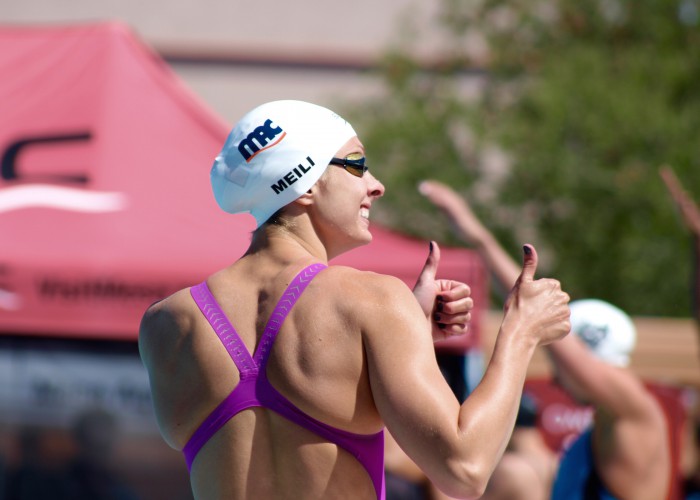
Photo Courtesy: Taylor Brien
I came back to school in August and was a little uneasy at first, but I knew I had to make things right. I vowed to “right all the wrongs I accumulated.” I didn’t know what that meant or what it was going to take, but it was a start.
There were days at the end of my junior year when I didn’t want to be at practice, and I would complain the whole time. I would be complaining constantly about people, practices, life, everything. People frequently got irritated with me, at least that’s what it felt like, which really ate at me. I didn’t want to be that way my senior year so I had to change my attitude. I wanted to be that senior that people looked up to and people wanted to be around, not the guy that complained and hated everything.
I was a lot happier at the start of the semester but I still had a few minor break downs along the way. There were times where I would get so stressed about a hard practice, that I would not perform up to my potential, or I would quit halfway through the set.
But the semester went on, and those days were behind me. I grew closer with a lot of my teammates and I was having less and less negative thoughts during practice. I was enjoying being around everyone every day and I felt closer to the team than ever before (thanks, Chainsmokers).
I often tell people that my favorite team I swam with was this past year’s team at my school. I truly mean that. I got asked the question, “who inspires you the most?” in class one day. I had to think about my answer.
“My teammates,” was my answer. “When I’m having a bad day or not swimming well in a set, I would hear words of encouragement from those around me. I would hear people shouting from across the pool during a hard set. I would hear guys and girls cheering each other on and having each others’ backs in practice–and in life. That is my biggest inspiration, and they helped me out of my depression.”
Ok, no one actually asked me that, but if they did, that’s what I would have said. I told this story to my team at our banquet last month. I told them everything that I had written here; how I was depressed, how I didn’t eat, how I got sick, and how all of them helped me out of it, even if they didn’t know it. I didn’t know if people would enjoy it or if people would think I was being over dramatic, but I felt like they needed to know.
I also didn’t know if I could really be of help to anyone with quasi depression or similar symptoms. I was lucky I was able to take a “break” from swimming with the flu or whatever it was, although that wasn’t necessarily ideal.
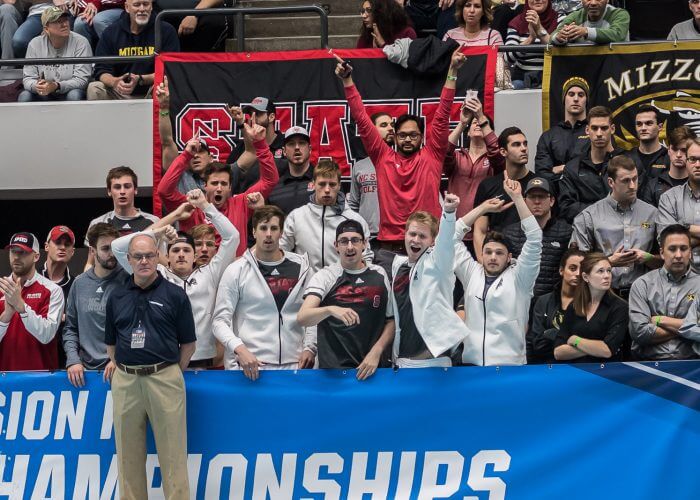
Photo Courtesy: Peter H. Bick
But the biggest piece of advice I could give with people suffering from quasi depression is that you need to look inside yourself. Who is in your front row of your life? Who are your surrounding yourself with? I have to admit that I got involved with more negative people, which took its toll on me. It caused me to lash out on my family and my teammates, causing them to not want to be around me, leading me to my feeling of isolation. This was not the person I wanted to become, but it was suddenly a reality. I used to never complain, but all of a sudden I was doing it every day.
I’m grateful for my teammates I had during my senior year, because their positive energy made me forget about a lot of the negative things I had said and done. It made me truly enjoy swimming again. I looked forward to coming to practice and seeing my teammates work hard.
It didn’t matter to me that I didn’t go a best time my senior year. What mattered to me was the fact that everyone was cheering their heads off when two of our seniors won events at conference in our home pool. What mattered to me was that everyone patted me on the back or gave me a hug when I started crying uncontrollably after I finished my last race.
I was crying because I kept thinking about June 2016, and how I almost left the sport at the lowest point of my life. I came back to swimming because I wanted to go out the right way. I didn’t want to be remembered as the negative, moody, irritable person I was my junior year. My coach told me after the meet was over, “You came up to me after that swim with a smile on your face and tears in your eyes. That is when you know you went out the best way you could have.”
All commentaries are the opinion of the author and do not necessarily reflect the views of Swimming World Magazine nor its staff.




The more we share that we humans…even our heroes and role models … are fragile and battle depression, the more the stigmas attached to depressive disorders is dispelled … truth is power????♀️??
Put your head down and do the work – it solves most things in life… O2
Works for me!??
Thanks Andy great article!!!
Alexandra
Sarya Lower
Joshina Teixeira I can relate to this story
Thank you for your honestyle and your story. Gteat article!
Swimming world needs to step it up
This article could not have come at a better time time. My daughter recently quit swimming and last night told me she was sad all the time . She couldn’t tell me what was making her sad. I know she has been off lately but I figured it was teenage hormones (she is 13). I am still trying to figure out how to help her and who to call, but this article was great. Thank for sharing
Shiela Mae Suario Stefanny Mhyrr Michelle Kaye Romano Rosarda
MJ Garcia
Awwww. Makapag enroll na nga.
Back in the 80s I was training in an extremely demanding program under a coach who offered little or no positive reinforcement except to a tiny handful of exceptional individuals. I didn’t have the background to handle the massive workload and began to totally break down after a couple of months without a single day off. How bad was it? I contracted shingles because my immune system collapsed. I missed almost a week of training, spending several days sleeping over 20 hours at a stretch, simply unable to pull my body out of a quasi coma. Blood work confirmed the dire condition of my immune system. Once I got back to training, it felt like starting over. Over the next few months, I was exhausted to the core, yet gradually I found it more and more difficult to sleep. It’s the classic downward spiral. An absolute nightmare. The coach’s solution? Work harder.
The problem was, I was already working as hard as I could and was getting slower. After our winter taper meet, I decided to take a much needed break and went home for two weeks. The first or second day home, I was leafing through one of my dad’s medical journals and in a stroke of serendipity, stumbled on an article titled “overtraining and depression in elite athletes”. As I read it, every word spoke of my story, my experience, my suffering. When you overtrain, your glycogen supplies become depleated, robbing the body of the energy needed to train. Along with the lack of energy come a list of symptoms that are identical to clinical depression.
There are times when willpower isn’t enough and working harder isn’t the answer–when it will only dig a deeper hole. Reading your story reminded me of my experience. I didn’t have trouble with my appetite, but not eating is a sure way to deplete the body’s energy system, crash its ability to recover, and drag the mind spiraling downward. I’m happy you found your way through that dark experience, and emerged into the light on the other side. I did too in a similar way. I started listening to my body during training and it worked. Instead of burying myself, I walked the razor’s edge with my effort and I improved day after day.
My point in sharing this story is that the depression symptoms we may experience as athletes can be the result of overtraining rather than clinical depression. Parents and coaches should learn to recognize signs when their swimmer is in trouble.
I agree entirely David G. There are so called ‘Olympic Coaches’ who still do not recognise they are overtraining their swimmers. Instead of learning from this they drop the athlete and move on to the next.
Thank you very much!
I appreciate this article and the advice the author shared as a result of his experience. Best wishes!!
Thank you!
We love and thank you Allison Schmitt??❤i
So many young men, women and adolescents go through similar experiences to this and can relate to your article. Too many GPs are quick to prescribe anti depressants when all that is really needed is support from those who care for you the most. Thankyou for sharing .
Great article that people need to read